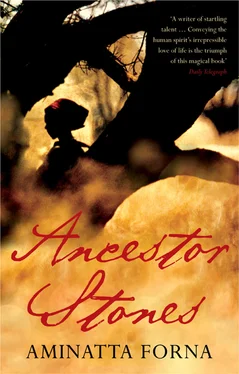Aminatta Forna
Ancestor Stones




I see her sometimes, usually when I least expect it: a reminder of her. In the bow of a lip: an outline a blind man could trace with his fingertips. The curve of the continent in the sweep of a skull, in the soft moulding of a profile. A man on a bus. Sitting alone. Tall above the slumped bodies of the other passengers: a surviving lily in a bowl of wilting flowers. For several seconds I gazed up at him. He never looked my way. The bus moved off over the bridge and I watched it go. And for a moment I felt it, the tightening in my guts, the drifting melancholy — the return of a forgotten nostalgia .
On Sunday mornings I have seen her in the shape of a thousand butterflies winging their way down the Old Kent Road, where only hours before razor-cut youths stumbled out of doorways and barelegged, barefoot girls walked home — holding on to their handbags and high heels. The butterflies’ dark heads were crowned with turbans, their bright robes like great iridescent wings billowed in the gusts of air from the passing traffic. In twos and threes they came together to form a colourful cloud, a great host of butterflies winging their way through the grey walls of the city to spiritual pastures: to the People of Destiny Mission, to the Temple of Christ, to Our Lady’s Church of Everlasting Hope .
What do they pray for, I wonder? Held captive by fate and history in this dark country .
For some miracle, a pair of ruby slippers? A click of the heels, a spinning tornado to whisk them up and set them down again in a place far, far away — beneath a burning amber sun .
1 Abie, 2003: The Women’s Gardens
London, July 2003 .
It began with a letter, as stories sometimes do. A letter that arrived one day three winters ago, bearing a stamp with a black and white kingfisher, the damp chill of the outside air, and the postmark of a place from which no letter had arrived for a decade or more. A country that seemed to have disappeared, returned to an earlier time, like the great unfilled spaces on old maps where once map makers drew illustrations of mythical beasts and untold riches. But of course the truth is this story began centuries ago, when horsemen descended to the plains from a lost kingdom called Futa Djallon, long before Europe’s map makers turned their minds to the niggling problem of how to fill those blank spaces.
A story comes to mind. A story I have known for years, it seems, though I have no memory now of who it was who told it to me.
Five hundred years ago, a caravel flying the colours of the King of Portugal rounded the curve of the continent. She had become becalmed somewhere around the Cape Verde Islands, and run low on stocks, food and water. When finally the winds took pity on her, they blew her south-east towards the coast, where the captain sighted a series of natural harbours and weighed anchor. The sailors, stooped with hunger, curly haired from scurvy, rowed ashore, dragged themselves through shallow water and on up the sand where they entered the shade of the trees. And there they stood and gazed about themselves in disbelief. Imagine! Dangling in front of their faces: succulent mangoes, bursts of starfruit, avocados the size of a man’s head. While from the ends of their elegant stalks pineapples nodded encouragingly, sweet potatoes and yams peeped from the earth, and great hands of bananas reached down to them. The sailors thought they had found no less a place than the Garden of Eden.
And for a time that’s what Europeans thought Africa was. Paradise.
The last time I thought about that story was a week after the letter came. By then I had left London — the city I now call home — to retrace the letter’s route to the place from where it had come and beyond. I was standing in a forest just like the one the sailors had stumbled into. And I remembered how in the early morning I used to watch my grandmothers, my grandfather’s wives, leave their houses and make their way, down the same path upon which I was standing, towards their gardens. One by one each woman parted from her companions and went to her own plot, whose boundaries were marked by an abandoned termite hill, a fallen tree, an upright boulder. There, among the giant irokos, the sapeles and the silkcotton trees of the forest, she tended the guavas, pawpaws and roseapples she had planted there. Then she weeded her yams and cassava where they grew in the soft, dark earth and watered the pineapple plant that marked the centre of her plot.
I thought of the sailors’ story. And for a long time, I thought it was just that. A story. About how Europeans discovered us and we stopped being a blank space on a map. But months later, after the letter arrived and I traced its arc and came to land with a soft thud in an enchanted forest, and after I had listened to all the stories contained in this book and written them down for you, that one story came back to me. And I realised the story was really about something else. It was about different ways of seeing. The sailors were blind to the signs, incapable of seeing the pattern or logic, just because it was different to their own. And the African way of seeing: arcane, invisible yet visible, apparent to those who belong.
The sailors saw what they took to be nature’s abundance and stole from the women’s gardens. They thought they had found Eden, and perhaps they had. But it was an Eden created not by the hand of God, but the hands of women.
The letter that brought me back to Africa came from my cousin Alpha. I didn’t recognise his hand on the envelope: he had never written to me before. Alpha had once been a teacher, but in those changed days he made his living composing letters for other people. People who took their place opposite him one by one, clutching a scrap of paper bearing the address of an overseas relative or else the business card of some European traveller, unwittingly exchanged in a moment of good humour for a lifetime of another person’s hopes. Alpha conveyed greetings, prayed for the recipient’s health, invoked the memory of the dead, and wrote hereby merely to inform them of the sender’s situation, the dislocations and hardships of the war. Sought their help in solving their many difficulties. By God’s grace. Thanking them in advance.
And then he swivelled the letter around to face his customer, for their perusal and signature. They nodded, feigning comprehension. And signed with a knitted brow and a wobbling hand the letters of their name learned by heart. Or else they pushed a thumb on to the opened ink pad, and left a purple thumbprint like a flower on the bottom of the page.
My own letter was written on a single side of paper taken from a school exercise book. No crossing out, no misspellings — suggesting it had been drafted beforehand and carefully copied out. Alpha’s signature was at the bottom of the page. Alpha Kholifa, plainly executed without flourishes, a simple statement. He used our grandfather’s name, the same as mine, so there could be no mistake. The other thing I noticed, only after I had read the letter through, was the absence of a post-office box address. Knowingly, he had denied me the opportunity to write back with ready excuses, to enclose a cheque bloated with guilty zeros.
Читать дальше















